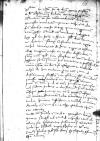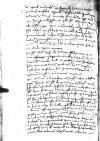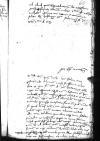⌊⌋ et exempla novitatum, quas mihi Reverendissimae Dominationis Vestrae frater obtulit, accepi easque, quia magnarum rerum gesta continent, non mediocri voluptate legi. Quod in praesens respicit
ill(ustrissimum) or ill(ustrem)⌈ill(ustrissimum)ill(ustrissimum) or ill(ustrem)⌉
⌊ ducem Bavariae⌋ ac dotationem ⌊filiarum Cristierni⌋ vincti regis, nihil moror, at de iure regni et cessione illius magnam censeo in eo fore difficultatem, scimus enim, quod viri illustres et rerum militiae expertes se non sinunt per tractatus a possessionibus munitissimis, nondum viso oppugnatore, evelle. Ideo nihil de hac materia, prout Vestra Reverendissima Dominatio desideravit, scripsimus nec consuluimus
ill(ustrissimo) or ill(ustri)⌈ill(ustrissimo)ill(ustrissimo) or ill(ustri)⌉
domino ⌊duci Prussiae⌋ nihil metuens, ne tangerem ... illegible⌈...... illegible⌉ ulcus. Pacem cum Vestra Reverendissima Dominatione et omnibus pacificis, extensis ad sidera palmis, a Deo precamur. Si eam tandem consequi pot... illegible⌈...... illegible⌉ peccatis ita nostris exigentibus {consequi} non mereamur, ventum telis committem et, quantum valet humana ind written over s⌈sdd written over s⌉ustria, a nocentibus et invadentibus cum Reverendissima Dominatione Vestra et aliis, opitulante Christo, ero attentus.
Mitto cum praesentibus Reverendissimae Dominationi Vestrae exemplum litterarum, quas scripsi ad reverendissimum dominum ⌊Cohinski⌋. Utrum illi collatus sit episcopatus Posnaniensis, non certum hab<e>o. ⌊Ioannes Benedicti⌋, regius physicus et ⌊ecclesiae nostrae⌋ canonicus, scribit, quod sit datus episcopatus Posnaniensis ⌊episcopo Vilnensi⌋.  AAWO, AB, D. 8, f. 61v Si quid nunc ultra in hac delatione Vestra Reverendissima Dominatio censebit agendum informandumque, relinquo id Vestrae Reverendissimae Dominationis innatae prudentiae. Ego autem in hoc pro nunc persto, eo quod iam conquesti sumus de consil<i>ariis, qui a conventibus, aliis insalutatis, sese absolvere soleant, ne in nobis duobus solum querulandi culpa transferatur. Hoc tamen mihi videtur pernecessarium, quo et Vestra Reverendissima Dominatio aviset reverendissimum dominum ⌊Chohynski⌋ et alios, quos habet in aula regia, amicos.
AAWO, AB, D. 8, f. 61v Si quid nunc ultra in hac delatione Vestra Reverendissima Dominatio censebit agendum informandumque, relinquo id Vestrae Reverendissimae Dominationis innatae prudentiae. Ego autem in hoc pro nunc persto, eo quod iam conquesti sumus de consil<i>ariis, qui a conventibus, aliis insalutatis, sese absolvere soleant, ne in nobis duobus solum querulandi culpa transferatur. Hoc tamen mihi videtur pernecessarium, quo et Vestra Reverendissima Dominatio aviset reverendissimum dominum ⌊Chohynski⌋ et alios, quos habet in aula regia, amicos.
Scripsi etiam nuper de latrone s written over q⌈qss written over q⌉ubdito meo, qui, me instange instigante, nonnullis, licet pacem mecum loquuntur, mala autem in cordibus eorum, ... illegible⌈...... illegible⌉ molestat praeter ius et rationem. Quid Vestra Dominatio Reverendissima censet, rescribere et consulere per opportunitatem dignetur, refer{r}am vicissim in maiori mutuum.
Hoc etiam Vestrae Reverendissimae Dominationi patefacere {non} possum, utpote quod aestate proxime praeterita, cum
ill(ustrissimus) or ill(ustris)⌈ill(ustrissimus)ill(ustrissimus) or ill(ustris)⌉
⌊dux⌋ vicinus noster ⌊Cracoviam⌋ versus proficiscens, apud me hospitans mentionem mihi fecit de
ill(ustrisimo) or ill(ustri)⌈ill(ustrisimo)ill(ustrisimo) or ill(ustri)⌉
duce ⌊Frederico Bavariae⌋, quod sollicitaret apud infeudatum nuper
ill(ustrissimum) or ill(ustrem)⌈ill(ustrissimum)ill(ustrissimum) or ill(ustrem)⌉
magistrum Prussiae, quo magister iam fratri suo ⌊Philippo⌋, ita eum nominavit, credo, resignaret. Quae, si iam facta non esset, futura tamen propediem fieri affirmavit. Ex his et aliis percallui, quod ⌊Federico duci⌋ non sit admodum affectus ⌊vicinus⌋ noster. Hoc in aurem secretam.
Postremo oro Dominationem Vestram Reverendissimam, quatenus praesentibus inclusas et ad reverendissimum ⌊archipraesulem⌋ intitulatas litteras ipsi ⌊archiepiscopo⌋ per opportunitatem, quia Vestrae Reverendissimae Dominationis vicinus habitat et inde plures quam ⌊hoc loco⌋ sese nuntii ad ipsam Reverendissimam Dominationem recipiunt, et illis has credere praesentendas velit. Non indigent exacta celeritate, nam
 AAWO, AB, D. 8, f. 63r nil aliud quam congratulationem de accessione archiepiscopatus continent.
AAWO, AB, D. 8, f. 63r nil aliud quam congratulationem de accessione archiepiscopatus continent.
Valeat Reverendissima Dominatio Vestra cum his in Christo optime mei memor et amans, ut solet.
Reverendissime Domine.
Cum mihi hic subditus meus proficiscendo ⌊Loboviam⌋ versus se offerret, volui has, ex quo frater Reverendissimae Dominationis Vestrae hactenus ex ⌊Monte Regio⌋ non apparuit, eidem Dominationi Vestrae Reverendissimae destinare, cum hoc indicare written over ...⌈... illegible⌈...... illegible⌉rere written over ...⌉, quod sum missurus proprium nuntium in causa ⌊ecclesiae⌋ meae ad sacram ⌊regiam maiestatem⌋ et illum solum tantisper retinebo, quousque certificatus fuero cum praesente nuntio, si quid litterarum Vestra Reverendissima <Dominatio> cum nuntio meo ad aulam ⌊regiae maiestatis⌋ mittere voluerit. Mandabo illi meo tabellario, quo illas atque meas fideliter praesentabit ac responsum exiget.
In novis praeterea nihil, quam super deduxi, ultra accepi.
Iterum Vestram Reverendissimam Dominationem ad multam aetatem rectissime valere cupiens faciam et ⌊regi⌋ mentionem de nostris delatoribus etc., rogabo on the margin⌈rogaborogabo on the margin⌉ ne consulamque eidem, nobis inauditis ne illis fidem praebeat etc.
Dat(ae) or Dat(um)⌈Dat(ae)Dat(ae) or Dat(um)⌉ ut supra, cursorio et celeri calamo.
 AAWO, AB, D. 8, f. 61v Si quid nunc ultra in hac delatione Vestra Reverendissima Dominatio censebit agendum informandumque, relinquo id Vestrae Reverendissimae Dominationis innatae prudentiae. Ego autem in hoc pro nunc persto, eo quod iam conquesti sumus de consil<i>ariis, qui a conventibus, aliis insalutatis, sese absolvere soleant, ne in nobis duobus solum querulandi culpa transferatur. Hoc tamen mihi videtur pernecessarium, quo et Vestra Reverendissima Dominatio aviset reverendissimum dominum
AAWO, AB, D. 8, f. 61v Si quid nunc ultra in hac delatione Vestra Reverendissima Dominatio censebit agendum informandumque, relinquo id Vestrae Reverendissimae Dominationis innatae prudentiae. Ego autem in hoc pro nunc persto, eo quod iam conquesti sumus de consil<i>ariis, qui a conventibus, aliis insalutatis, sese absolvere soleant, ne in nobis duobus solum querulandi culpa transferatur. Hoc tamen mihi videtur pernecessarium, quo et Vestra Reverendissima Dominatio aviset reverendissimum dominum  AAWO, AB, D. 8, f. 63r nil aliud quam congratulationem de accessione archiepiscopatus continent.
AAWO, AB, D. 8, f. 63r nil aliud quam congratulationem de accessione archiepiscopatus continent.


